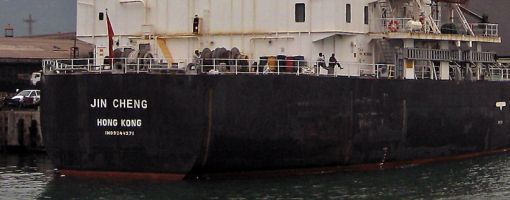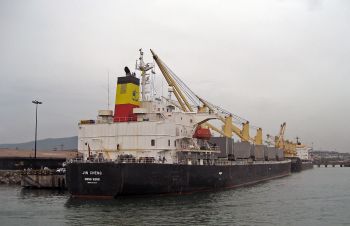
The Norwegian Support Committee for Western Sahara has for the fist time discovered that a shipping company registered at the Oslo Stock Exchange is transporting phosphate from Western Sahara.
Press release
The Norwegian Support Committee for Western Sahara
6th of February 2008
Trade in phosphate from Western Sahara is in violation of international law. Last December, KLP (one of Norway's largest life insurance companies) divested from the Australian fertilizer company Wesfarmers because of their illegal import of this merchandise. Morocco is occupying Western Sahara and exploits the natural resources of the country with no benefits for the local population.
Two weeks ago the Norwegian Support Committee for Western Sahara heard of a bulk carrier called "Jin Cheng" on its way to New Zealand with phosphate from occupied Western Sahara. The Support Committee contacted the shipping company Jinhuis head office in Hong Kong, asking them to confirm that the ship belonged to them. No response has been given. In the meantime, however, national port authorities in New Zealand have confirmed to the local Support Committee for Western Sahara that we are dealing with a ship from Jinhui.

On the 29th of December the carrier was observed near the Canary Islands, just off the coast of Western Sahara. Today, on the 6th of February, the Hong Kong registered ship will arrive in New Zealand.
"This is trade in stolen goods and should cease immediately", says Ronny Hansen in the Norwegian support Committee. "Western Sahara is the last African colony and all of Morocco's mining and sale of the countrys natural resources is both illegal and highly unethical. We demand that Jinhui immediately informs the liberation movement Polisario, the Norwegian Investors and the Norwegian Ministry of Foreign Affairs of how deeply involved they have been in this commerce", he states.
The Norwegian Ministry of Foreign Affairs discourages trade with Western Sahara.
"It is important that Norwegians who invests in Jinhui know that the company violates international law when engaging in unethical trade in stolen resources from the occupied territory. When the Norwegian seismic company TGS-Nopec a few years ago was involved in activities within the occupied areas, it lost 20 shareholders after these were informed of the ethical aspects of the company's activities. We assume that Jinhui will explain its involvement in Western Sahara if they wish to avoid this kind of negative reaction from Norwegian investors", Hansen states.
Yara previously imported this phosphate to Norway, but in the summer of 2005 the company made public that it had terminated this trade.
"The natural resources, and particularly phosphate, was one of the main reasons for the occupation of Western Sahara in 1975. Transporting phosphate mined by the Moroccan phosphate company in the occupied areas is unethical and politically very controversial. It contributes to legitimize, strengthen and prolong the occupation," Hansen confirms.
After reaching Northport, New Zealand, today, it continues to the cities Tauranga and Bluff, and finishes unloading its cargo next week.
The local phosphate importer in New Zealand is called Ballance Agri-Nutrients, and is one of New Zealand's major fertilizer manufacturers. See photos of the company and of the port in Tauranga. The photos were taken by the New Zealand Western Sahara Association and are available free of charge. You will find a high-resolution image by clicking each photo.
There are also free video material of the national Moroccan phosphate company operating inside the occupied territories, as well as recent video footage from Port Tauranga and from the local phosphate importer.
For more information or further commentary, contact the head of the Support Committee for Western Sahara, Ronny Hansen, on ronny@vest-sahara.no. www.vest-sahara.no
Foto above is from last year, and is taken from www.shipspotting.com.
NY Check new Western Sahara poster!
“Try to Visit Western Sahara”…
The Security Council fails Western Sahara and international law
On 31 October 2025, a new resolution was adopted in the UN Security Council calling on the Saharawis to negotiate a solution that would entail their incorporation into the occupying power, Morocco.
Saharawis Demonstrate Against Trump Proposal
The United States has proposed in a meeting of the UN Security Council on Thursday that the occupied Western Sahara be incorporated into Morocco.
Skretting Turkey misled about sustainability
Dutch-Norwegian fish feed giant admits using conflict fishmeal from occupied Western Sahara. Last month, it removed a fake sustainability claim from its website.



